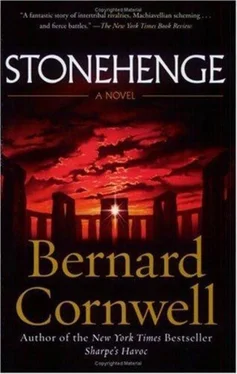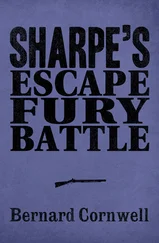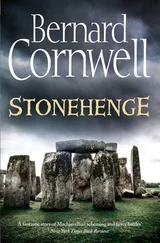'The pattern?' Saban said. Haragg had mentioned the pattern in the north country, but would not explain it. Now Camaban would tell him.
To do so Camaban stooped and plucked an arrow from Saban's quiver, for Saban went nowhere without his yew bow, which was a symbol that he was no longer a slave. Camaban used the arrow's flint point to scratch a wide circle in the turf, gouging it so that the soil showed brown through the sallow grass. He said, 'The circle is the sun's year. We know that circle. We mark it. Here in Sarmennyn they kill a girl each midsummer to show when one circle ends and the same circle begins again. Do you understand that?' He was looking at Saban for Haragg already knew of the broken pattern.
'I understand,' Saban said. At Ratharryn they also marked the circle's end and beginning at midsummer, though they did it by killing a heifer at sunrise rather than a girl at sunset.
'Now for the mystery,' Camaban said, and he gouged a much smaller circle, placing it on the larger scratched ring like a bead on a bronze wire circlet. 'That is Lahanna,' he said, tapping the small circle. 'She is born, she grows' — he was tracing his finger about the bead — 'and dies again. Then she is born again' — he made a new circle, the same size as the first and next to it — 'she grows and dies, and then is born again.' He scratched a third circle. What Camaban had drawn now looked like three beads that almost, but not quite, filled one quadrant of the big circle of the sun. 'She is born, she dies,' he said again and again, drawing more circles until he had made twelve beads, and then he stopped. 'You see?' he said, pointing the arrow's head to the gap between the last and the first bead.
The circle now had twelve beads. 'Twelve moons in each year,' Camaban said, 'but the mystery is here.' He tapped the small space that was left between the first and the last of the moon circles.
Haragg turned to Saban, eager that he should understand. 'The moon's year is shorter than the sun's year.'
Saban understood that. The priests at Ratharryn, indeed priests everywhere, had long noted that the moon's year of twelve swellings and shrinkings was shorter than the sun's great circuit about the sky, but Saban had never thought much about the disparity. It was one of life's constant mysteries, like why stags only wore antlers for part of the year, or where the swallows went in winter. He watched now as Camaban brought a human thigh bone from his bag.
'When I was a child,' Camaban said, 'I sat in our Old Temple and watched the sky. I would go to the Death Place and steal bones, and I would mark the bones like this one.' He gave the bone to Saban. 'Look,' he instructed him, pointing to a series of small marks that had been cut into one long side of the bone. 'Those marks are the days of the sun's year.'
Saban had to hold the bone close, for the marks were tiny, but he could see hundreds of nicks, far too many to count, and each tiny scratch marked a day and a night, adding to a year. 'And these marks' — Camaban showed Saban a second set of scratches that lay parallel to the first — 'are the days of the moon's growing and dying. They show twelve births and twelve deaths.' The second set of marks was fractionally shorter than the first.
Saban again held the bone close to his eyes and used his fingernail to count the extra days on the sun's line. 'Eleven days?' he asked.
'So far as I can tell,' Camaban said. His scornful tone was gone, replaced by an earnest humility. 'But the days are hard to count. I used many bones over many years, and sometimes there was too much cloud and I had to guess the days of the moon, and some years the gap came to more than eleven, and sometimes it was less.' He took the bone back from Camaban. 'But this bone came from the best year, and it tells the same message as all the bones. It tells me that the pattern is broken.'
'The pattern?'
'The circles should meet!' Camaban said fiercely, tapping the diagram he had scratched into the turf. 'That gap' —
he put his finger on the space between the beads — 'is eleven days long. But it should not be there.' He stood again and began to pace. 'To everything in the world there is a purpose,' he said, 'for without purpose there is no meaning. And the meaning is in the pattern. Night and day, man and woman, hunter and prey, the seasons, the tides! They all have a pattern! The stars have a pattern. The sun follows a pattern, the moon follows a pattern, but the two patterns are different, and the world is being split into two.' He pointed towards the sea. 'Some patterns follow the sun, others the moon. The crops come and are cut with the sun, but the tides follow the moon — why? And why did Dilan send the gold to Erek?' He used the Outfolk names for the gods of the sea and the sun, then answered his own question fiercely. 'He sent it so that the sun would take the sea tides back into his pattern!'
'Women follow the moon pattern,' Haragg said gloomily.
'They do?' Camaban sounded surprised.
'In their bleeding,' Haragg said, then shrugged, 'or so I'm told.'
'But everything,' Camaban declared, 'everything should follow the sun! All should be regular, but it isn't.' He pointed again at the pattern in the turf. 'The mystery is how to make the pattern right.'
'How?' Saban asked.
'You tell me,' Camaban said, and Saban understood that the question was not lightly asked.
He stared at the pattern. Think of it, he told himself, as beads on a bronze wire and then the answer was obvious. A man could make more beads, smaller ones, and try to thread them until they filled the wire perfectly, but that would be a laborious task. The simple way to make the beads fit was to shorten the wire, a task that would be easy for any smith. And if the wire were shortened, the big circle would be smaller and the beads would all touch. 'Slaol must be brought closer to the earth?' Saban suggested diffidently.
'Well done,' Camaban said warmly. 'So what does that tell you?'
Saban thought long and hard, then shrugged. 'I don't know.'
'We tell stories about how Slaol and Lahanna loved each other and then became enemies, but those are just stories. They leave something out. Us. Why are we here? We know that the gods made us, but why? Why do we make things? You make a bow — to kill. You make a pot — to hold things. You make a brooch — to fasten a cloak. So we were made for a purpose, but what was that purpose?' He waited for an answer, but neither Haragg nor Saban spoke. 'And why are we flawed?' Camaban asked. 'Would you make a bow that was weak? Or a pot that was cracked? We were not made flawed! The gods would not have made us flawed any more than a potter would make a bowl that was cracked or a smith would make a knife that was blunt, yet we are sick, we are maimed and we are twisted. The gods made us perfect, and we are flawed. Why?' He paused before offering the answer: 'Because we offended Slaol.'
'We did?' Saban asked. He was accustomed to the story that Lahanna had offended Slaol by trying to dim his brightness, but Camaban was now blaming mankind.
'We offended him by worshipping the lesser gods as fervently as we worshipped him,' Camaban said. 'We insulted him, and so he moved away, and now we must draw him back by worshipping him as he is supposed to be worshipped, by giving him his proper place above all the other gods, and by building him a temple that will show him we have understood his pattern. Then he will come back, and when he returns there will be no more winter.'
'No more winter?' Saban asked in astonishment.
'Winter is Slaol's punishment,' Camaban explained. 'We offended him and so he punishes us each and every year. How? By moving away from us. How do we know that? Because the farther you stand from a fire, the less heat you feel. In summer, when Slaol is near us, we feel his heat, but in winter, when things die, his heat goes. It goes because he is far from us, so if we can bring him back then there will be no more winter.' He turned and faced the sun. 'There will be no more winter,' he said again, 'and no more sickness, and no more grief, and no more children crying in the night.' There were tears in his eyes, and Saban remembered the night when Camaban's mother had died and the crooked child had howled like a wolf cub.
Читать дальше
Конец ознакомительного отрывка
Купить книгу












